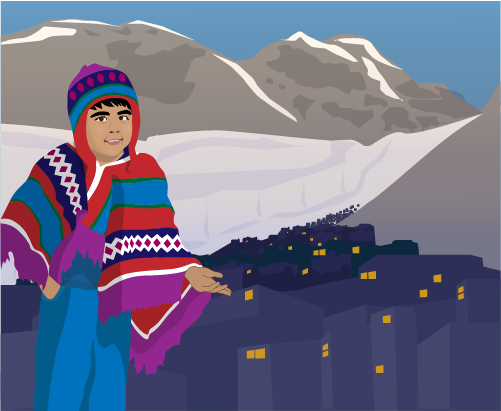Living on Top of the World (Speaking: 990L; CEFR B1)
Click on "record" to start practice. Read as clearly as you can.
Listen to a speaker read the passage aloud. You do not need to read aloud.
Listen to the speaker. Repeat after each sentence and check your pronunciation.
Good job! Thanks for reading.
Error
An error occured while posting your file to the server. Your submission has NOT been received. Please refresh the page and try again.
Can you imagine what it would be like to live at about five thousand one hundred meters, or about sixteen thousand seven hundred feet, above sea level? Can you imagine living with limited access to facilities like hospitals or trash removal? Welcome to La Rinconada!
My name is Alfredo. I am fifteen years old, and I live in the highest town in the world. My town is located in southeast Peru on the side of a mountain and sits beneath a giant glacier called “Sleeping Beauty.” The town is not only famous because of its height, but it also has gold nearby! This means that mining is the main job for local people. Many hope to get rich, but the work is often challenging and unsafe. It can also cause environmental problems such as metal pollution in the surrounding area, due to the processing of gold.
The air is very thin in the mountains, and people who aren’t used to such heights can get very ill if they spend a long time here. Most local people have become accustomed to conditions in the mountains, but sometimes they can suffer from mountain sickness too. We don't have any hospitals here, so we have to travel a long way by truck to access medication. The trip can be dangerous as the road is often covered in rocks and ice.
Life can be very challenging in La Rinconada because we don’t have running water, so we use water from the glacier and rain. We don’t have anyone to collect our trash either, so most people burn it or bury it. The temperature is normally below zero for much of the year, and the landscape is covered in snow. We do have electricity, though.
Education is a low priority here in La Rinconada, but it doesn’t mean I don’t have plans for my future. I choose to go to school because I want better opportunities—different from the ones my parents had. Without education, nothing will change in La Rinconada. My ambition is to be an engineer when I’m older because I’m interested in how things work.
People of my town worry about its future. With the rising temperatures due to climate change, the glacier above La Rinconada may be gone in a few years. We may lose our homes if we don’t slow this process down. We need to regulate our mining practices and start taking better care of our environment for our future here in the mountains.
Processing
